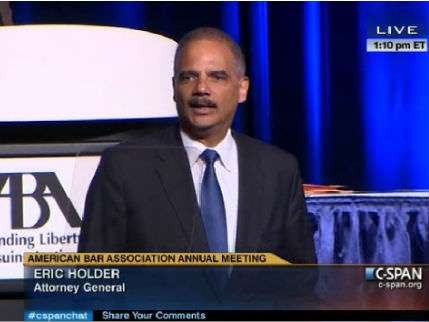If Holder's Mercy Helps 2% of Federal Drug Offenders, It's Still 2,500 Times As Impressive As Obama's

Last week, as Ed Krayewski noted, Attorney General Eric Holder told federal prosecutors his new charging guidelines for drug offenders should be applied to pending cases as well as new ones. But how many cases are we talking about? How many defendants will escape mandatory minimum sentences as a result of Holder's policy, under which charges will not specify drug amounts when offenders meet certain criteria? About 500 a year, according to an estimate by Paul Hofer, a policy analyst with Federal Public and Community Defenders. That's about 2 percent of the 25,000 or so federal drug offenders sentenced each year and less than 4 percent of the 15,000 sentenced under statutes that specify minimum terms.
Hofer's calculation, which is based on records for fiscal year 2012, excludes defendants who already benefit from sentence reductions because they qualify for the statutory "safety valve" or because prosecutors certify that they have rendered "substantial assistance" to the government. It also excludes defendants who would fail Holder's criteria, which include no supervisory role, no violence or possession of firearms, no sales to minors, no death or serious injury associated with the offense, and fewer than three criminal history points. Hofer notes that one of Holder's criteria—that the defendant "does not have significant ties to large-scale drug trafficking organizations, gangs, or cartels"—is too subjective to be measured by case records. He concludes that "401 defendants in FY2012 would clearly have benefitted if the memo had been in effect and was fully implemented by line prosecutors." He counts another 129 who were sentenced below the range recommended by federal guidelines but still were hit by statutory minimums and therefore might have benefited from Holder's new policy.
Hofer's estimate jibes with the experience of Arizona defense attorney Mark Willimann, who notes that Holder's guidelines allow as many as two criminal history points (CHPs), while the statutory safety valve allows no more than one. For example, Willimann says, "a defendant who gets a DUI and receives a 60-day sentence would get two CHPs. Should he get caught for a drug offense, he would not be eligible for the safety valve." But under Holder's guidelines, he would be, assuming he met the other criteria. Willimann figures "about 50 clients out of the 1,000 I have represented over the last 10 years would have received a hugely discounted sentence given Holder's changed policy, which would have meant, on average, a 36-month shorter sentence," with some defendants getting five years less than they otherwise would. In short, he says, "while the numbers aren't that significant, the benefit an individual gains for qualifying is huge."
One might add that 500 shortened prison terms in one year is 500 times the number Obama has managed in five, even though his commutation power, unlike Holder's prosecutorial discretion, is legally unrestricted. If Holder's mercy helps 2 percent of federal drug offenders, it will still be 2,500 times as impressive as Obama's.


Show Comments (35)